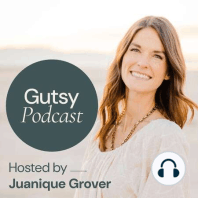63 min listen

Bread That Won't Kill You - How to Safely Reintroduce Grains
Bread That Won't Kill You - How to Safely Reintroduce Grains
ratings:
Length:
66 minutes
Released:
Sep 15, 2020
Format:
Podcast episode
Description
Show Summary: In this episode, Nathan, the founder of Time Traveler's Bakery, shares his health history & journey on how he started his company. He tells why he should watch every food he eats because of his autoimmune disorder. His chronic fatigue began when he was 14 years old up to the mid-20s. He experienced full-body pain from his back, lower and upper shoulders, neck, and head, which made him think that by the time he was 35, he'd probably have some assistance with a walker or wheelchair.He then decided to go to a therapist and had some elimination diet, where he gradually felt that the pain was decreasing. He cut out some food that helped him overcome his depression and chronic fatigue, but he figured he still lacked the nutrients he needed. He knew he had to do something to get back to gluten and wheat without experiencing extreme pain, and that's how the Time Traveler's Bakery started.They call their bakery "Time Traveler's bakery" because they believe in the phrase "Back In Time, Back In Health." He says if we go back in time and make it that old way, then autoimmune disorders might not exist anymore.Important LinksSunset Farmer’s MarketTime Traveler’s BakeryProvo Health (gutsy - discount code)Order their bread3 Exceptional Highlights:My body has worth, my spirit has worth, my brain has worth. I need to honor them and let them speak to me.It’s a balance thing, because we used to care about balance. And now it's all about marketability, right? So they are willing to sacrifice a lot of the underlying function and quality to get a more marketable product. It's like what we do with dogs, right? We breed them into this state where they have hip problems and back problems, nasal problems, eyesight issues, and all of that, but they look really good.It's so important to reintroduce foods again, and make sure that you are feeding multiple species, multiple foods and you're rotating your foods, and you're eating like 50 different kinds of foods, 100 different kinds of foods, because that's what we did in the old days.Show Highlights: Why should you get rid of Glyphosate?16:00 NathanModern wheat sometimes contains what are called desiccants, which we have referred to one of them as glyphosate. Glyphosates are commonly marketed under the name Roundup. Roundup is weed killer, we do apply it directly to our wheat supply in America.We're eating the Chihuahua of wheat now.19:58 NathanThink about who dogs’ ancestors were. They wolves righ? Now, think about a Chihuahua. Our modern wheat is literally called dwarf wheat. Our ancient wheat grew tall. I'm six two and it grew almost as tall as me sometimes.What is Frankenstein food?21:09 NathanHybridization is very closely linked with GMO. Hybridization is going to be where we take wheat as a type of grass. So we're going to take this type of grass that grows really short and then we're going to crossbreed it with the natural normal wheat that grows really tall.Just because it's organic, that doesn't mean it can't be heavily hybridized and heavily crossbred.24:44 JuaniqueSo it's still hard to digest. It will still tear up your gut. It'll still cause a leaky gut, even though it's organic. Because now you don't have the glyphosate but you still have the high amount of phytic acid which is shelf stable, but not digestible. Don’t forget to subscribe to Apple Podcast and
Released:
Sep 15, 2020
Format:
Podcast episode
Titles in the series (100)
Bonus Episode: Deconstructing Our Cultural and Societal Health Norms by Gutsy Health | Nutrition and Medicine